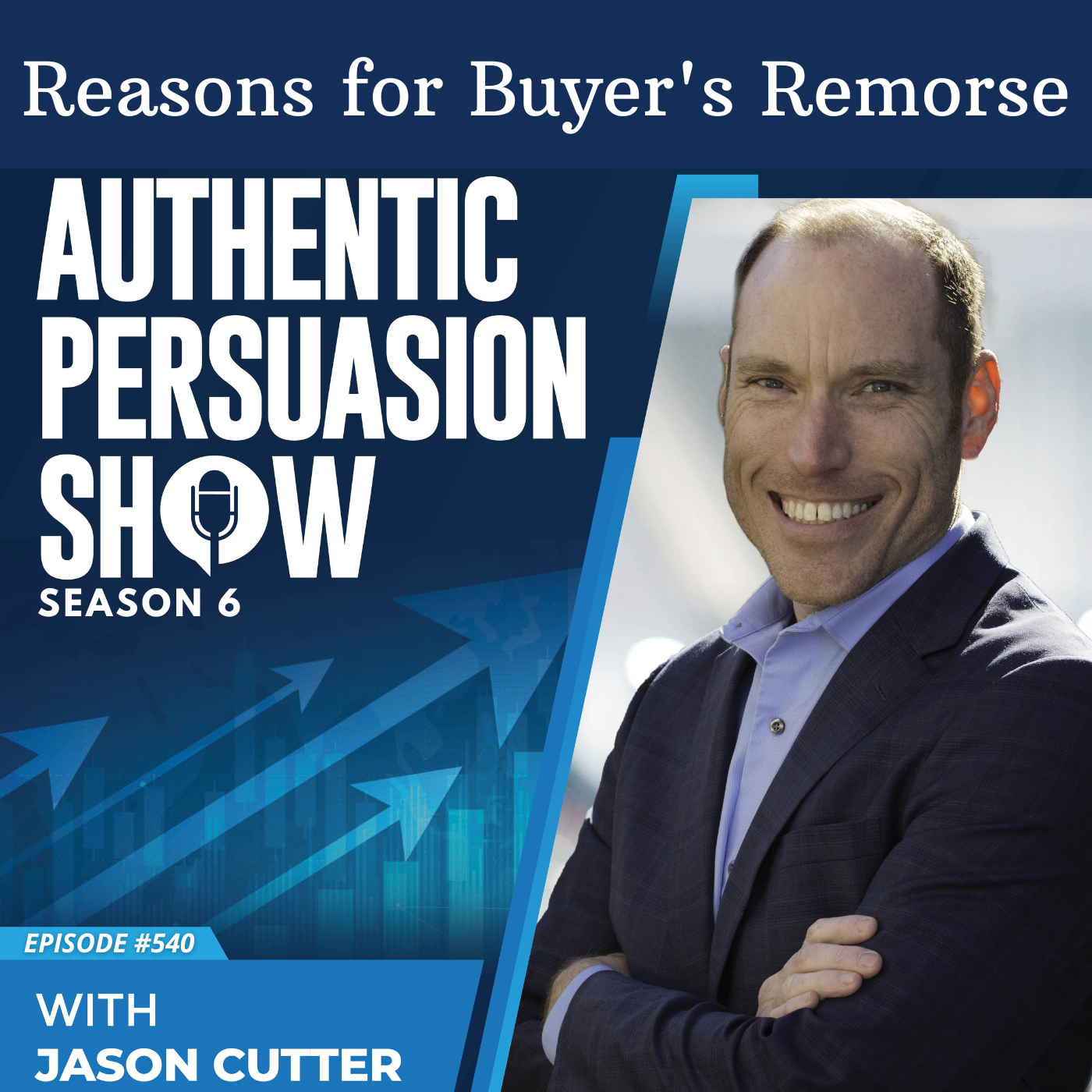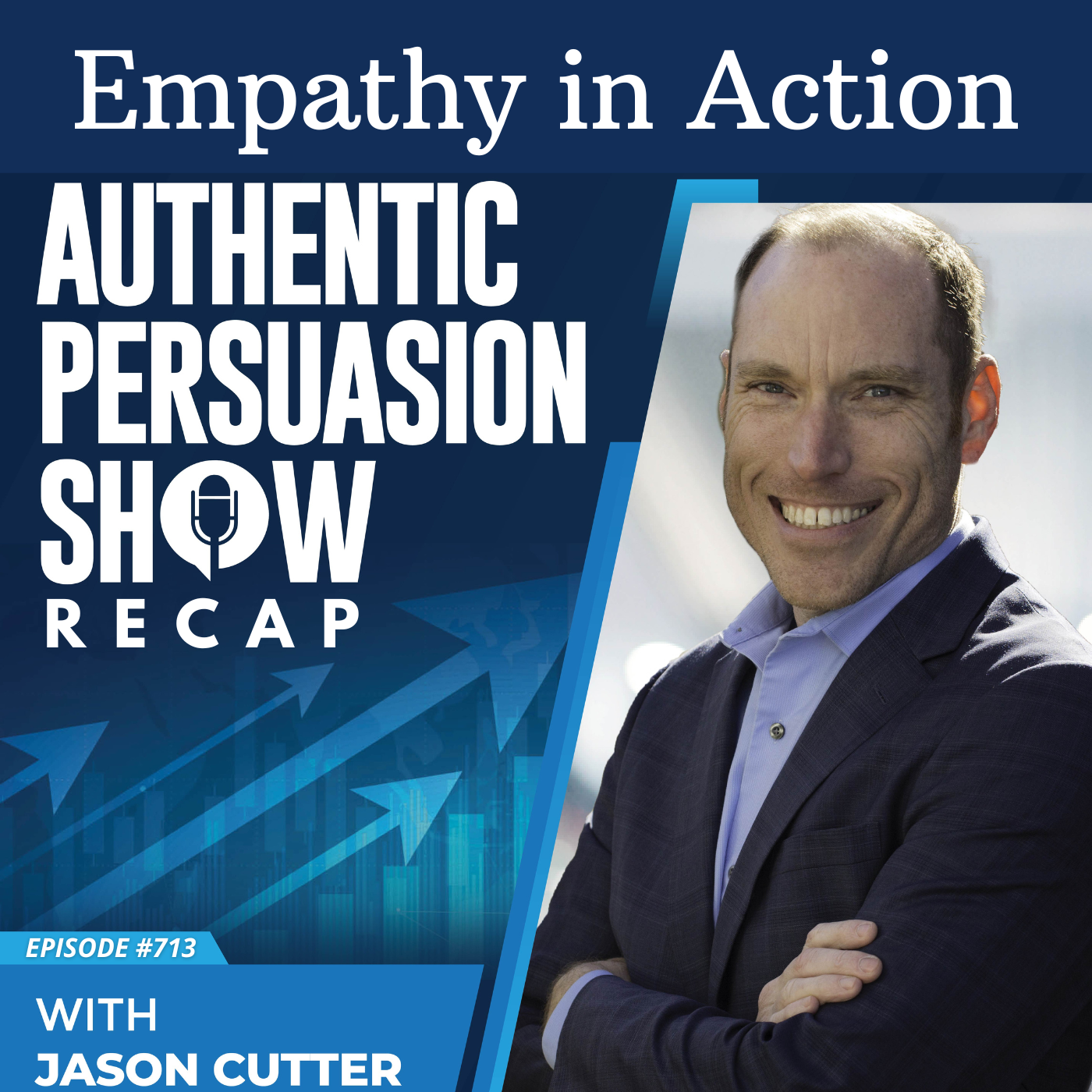Show Notes
Part 3 of my conversation with Kwame Christian, Director of the American Negotiation Institute.
Some gems from Part 3:
“Oh, I’m talking to a salesperson. That means they’re trying to sell me on something.” (Explaining Reactive Devaluation)
“The best sales experience experiences are the ones that leave me in a better position than where I started win, lose or draw.”
“As long as this failure helps me to advance my position, good.”
Download The Power of Authentic Persuasion ebook
Enroll in the Authentic Persuasion Online Course
Get help with your sales team
Connect with Jason on LinkedIn
Connect with Kwame on LinkedIn
Kwame’s Bio:
Kwame Christian, Esq., M.A. is the Director of the American Negotiation Institute where he conducts negotiation and conflict management workshops around the country. As an attorney and mediator with a bachelors of arts in Psychology, a Master of Public Policy, and a law degree, Kwame brings a unique multidisciplinary approach to making difficult conversations easier. In addition to his role with the American Negotiation Institute, Kwame also serves as a professor at The Ohio State University Moritz College of Law, the top ranked dispute resolution program in the country, and Otterbein University’s MBA program.
He is the author of the best selling book Nobody Will Play With Me: How to Use Compassionate Curiosity to Find Confidence in Conflict and his TEDx Talk, Finding Confidence in Conflict, was the most popular TED Talk on the topic of conflict of 2017. Kwame also hosts the top negotiation podcast in the world, Negotiate Anything. The show has been downloaded over 1,000,000 times and has listeners in 183 different countries.
Kwame’s Links:
E206 – Transcript
Jason: Welcome back to another section of the guest conversation I had with Kwame Christian. We are having a great conversation about negotiation, sales, conflict, all of those strategies. If you haven’t, make sure you check out parts one and two. Here you go. Part three, enjoy.
Kwame: One of the things that people say is that negotiation is the art of deal making. I think about it more as the art of deal discovery. So what I’m going to do is I’m going to work with you to see if a deal exists. I need to learn more about you or more about your company, your perspective, and see if there is a deal to be had. Because if I think about it as deal making, then I might feel unnecessary and inappropriate pressure to make a deal and force a deal when it’s not appropriate.
Jason: Yeah, I mean, the first part is to make sure that there is something there to even work with, right? Are they a qualified person? Whether you’re selling your negotiation training, I’m doing consulting or we’re working with sales people or anybody to, you know, and they’ve got to make sure there’s a qualified prospect, like is the other person you’re talking to, even a good fit. And then from there it’s okay, so you got to do your discovery and then from there, okay, then what are the terms or how do we get there? It’s interesting because my brain is just thinking like instead of even salesperson, like you’re just a facilitator, right? I mean, yes, mediator and kind of what you’re talking about, you’re almost a success facilitator as a salesperson because you’re just trying to help the other person get to a better place.
Kwame: Exactly. And I think in some companies you’re seeing them move away from the term salesperson. And in negotiation there’s a concept called reactive devaluation. And so essentially this is a bias. The easiest way to think about it is, I call it the, because you said it, I don’t believe it, bias.
Jason: So that’s, uh, so you mean dealing with kids?
Kwame: Exactly, that’s exactly the example, because sometimes it’s like, Oh, I’d tell my son to do something and then they’re skeptical and then somebody else says the exact same thing. They’re like, Oh, that’s a good idea. What happened? Oh, you said it. So I don’t believe it. And so it’s that mentality oftentimes it’s like, Oh, I’m talking to a sales person. That means they’re trying to sell me on something.
Jason: Their motivation is one-sided. And so either not trust them or be worried and on high alert all the time.
Kwame: Exactly. And then the, I think this is a great way to segue back to the conversation about win-win because this is what we’re really going for. We want to have a conversation where we have the tone, the feeling around it is collaborative, where I’m working with you. And I think that’s where the idea of when win comes from, right? Because technically if we’re having a fantastic deal, yeah, I get a commission and you improve your life.
Jason: Yeah. And there’s nothing wrong with that. Right? That’s just capitalism. That’s commerce. That’s trading value.
Kwame: Exactly. Yeah. So I think it’s really the tone trying to make it clear to them that, listen, I am not trying to take advantage of you. I’m here to work with you. And if you think about Jim Camp’s approach to negotiation, it’s called start with No, which is really interesting because what they found is that when people say no, the emotion that they’re trying to get to is safety. I say no because it feels safer than saying yes because yes commits me to an uncertain future. And so one of the things I like to do when in my difficult conversations is I start off by letting them know, listen, it is okay to say no, I’m going to talk to you about this. And it might not be for you. And if it’s not, that’s fine. Not a problem. And so when you let people know, Hey, you have the right to say no, just that acts can make them feel a lot more comfortable in the conversation because it’s the exact opposite of what they anticipate you’re going to do as a salesperson.
Jason: And I love that because I’ve always done that and tried to encourage other people in sales to do that as well, which is start off the conversation with this may not be a good fit and if it isn’t, I’ll let you know. Or if you don’t think it’s a good fit, you let me know. But like the point is the collaborative, right? It’s a good fit. I’m not going to try to sell you just for the sake of selling you. And that’s one of the big things, you know, I even see a lot of value in that. Even as a sales person telling somebody know like, Hey, this isn’t a good fit, this isn’t a good solution, whatever it is, which usually blows their mind because no one would ever think that would happen from a sales person. And then turning that into a relationship or referrals or just pointing them in a better direction, knowing you did the right thing. When you come from that approach, then when you do say yes or you know it’s the right thing, then you know it’s the right thing. Right?
Kwame: Exactly. Yeah.
Jason: So let’s talk about, so you have all this experience negotiation media. And it’s funny because every time we talk about negotiation and you mentioned it, all I can think of is like hostage negotiation. I don’t know why, but like literally that’s just what comes to my mind. So talking about sales, you know, what do you see as a great sales experience bringing in all these aspects in your psychology, in the legal and the mediation and that kind of approach. Like what do you see as that great sales experience?
Kwame: I would think about it from a big picture perspective. And so a lot of times the issue that we have in these conversations and perspective towards the conversation is the fact that we have a narrow minded view, just a myopic perspective on what the goal is. Because we get so fixated on this particular person, this commission, this opportunity that we forget, Hey, this is really just but one move in a larger chess game of life. Right? And so when I think about a good sales experience is after the fact. If I look back on it one year, two years, 10 years in the future, I need to ask myself, did I put myself in a better position overall, did this work for me personally? They didn’t work for me professionally. And when I think about it, big picture, a lot of times it makes the situation easier to handle because I feel less pressure first of all. And second of all, it helps me to be a little bit more strategic with the decision. It actually helps me to say no to clients a lot more effectively as well. So for me, I think about the big picture, I don’t want to focus on the short term emotions because eventually that’ll fade away or the thing that’ll stay is my position after the fact. So for me the best sales experience experiences are the ones that leave me in a better position than where I started win, lose or draw.
Jason: Got it, makes sense. And as far as salespeople go and all of your experience, what have you seen either yourself and others that make for a really professional like high quality, high performance salesperson? In terms of what we’re talking about, right?
Kwame: I would say it is the willingness to lose. So this is going to sound weird. There’s a section in my book called the license to fail because if you’re not experiencing certain types of failures, it might be an indication that you’re not trying hard enough. And so the salespeople that I think are going to do the best are the ones that almost embrace failure. They’re not going out there trying to lose like, Hey, I hope I lose today. Saying that I am going to employ the techniques that I believe are best. I learned a new technique. I’m going to try this technique because I think it might improve my ability to close. And if by pushing somebody and going through that, that productive tension, I ended up losing a client and I say, okay, I’m going to use this as a learning experience and I’m not going to shy away from it. And I think that’s an important part of sales, but just really any competitor in general, if you want to improve your position in life, if you want to get better at something, you need to give yourself the license to fail to see what your limits are so you can improve and get that data so you can make better assessments going forward.
Jason: That’s brilliant. I absolutely love it because I’m listening to it and thinking, I was just having a conversation yesterday with somebody where we were talking about, you know, there’s two ways to learn in life, right? Is to do it right and then to fail and then learn from it and then know what not to do next time or to read and study other successful people to figure out how to be successful. That is great and everyone will always tell you, do that. Read about successful people, learn what they do. Copy what they do. Success leaves clues like do that. However, as humans, as most people, we learn best and strongest. When we make those mistakes. Now it’s good to take what you read or learn about somebody else and what they’re doing successfully. Like offline, before we started talking, we were talking about Ted talk and the one you did and I’m super curious about if you could tell me all the tips you want.
Jason: I could study, all I want, doesn’t matter. I’m going to get out there if I fail or I stumble. Like that’s the way it’s going to permanently imprint, but I’ve got to do it right. And I think the key differentiator too with what you’re talking about is the difference between failure and lose. Correct me if I’m wrong here, right? So in my opinion, life is about failing. I mean obviously if you’re getting outside of your comfort zone, you’re going to fall down, you’re going to fail, right? Losing is when you stop and you don’t try to improve and you just give up, right? That’s losing, right? So imagine a kid, right? So you have four year olds learning to start walking years ago, falls down for the first time and just never gets up again and says, Hey, that’s not for me. I’m just not going to walk. I don’t think I’m meant for it. Right. He failed because he fell. We all did when we learned to walk and then got back up and kept doing it. Right. Versus losing, which is, I tried it once, it didn’t work. Now I quit.
Kwame: Exactly. I think that’s a key distinction because the thing I like to say to myself is fail forward. Yup. As long as I’m moving in the right direction. Kind of going back to what I said before, it’s all about positioning. As long as this failure helps me to advance my position, good. It was an important part of the process and we have to remember that we are the authors of our own life. And so when it comes to what happens in our life, it’s up to us to give that thing meaning to interpret it in a way that’s most favorable to us. And so in my book, I’m not a loser. Yeah. I have some failures along the way, but I’m asking myself as I’m pending the story of my life. I say for quantum, we got back up and this was a success. This was actually beneficial because blah, blah, blah. We have that opportunity.
Jason: Yeah. And I think that’s good. And I, and I will speak from a sales management experience, which I’ve done for a very long time. I have never been upset or frustrated with a salesperson who tried new things or pushed the boundary or you know, as long as it’s coming from a good place in their heart and with the right focus and plate and intention, right. As long as it’s coming from the right intention, whatever they do, if they don’t close the deal or if it doesn’t work out in their favor, but they’re trying new things and they’re going after new approaches and they’re doing that, never been upset, never been frustrated. More frustrated with the ones who don’t do anything different and it’s not working right. Like they’re beating a headache, their head against the wall and they don’t realize that doesn’t work. And they’re not willing to try anything different cause they’re so scared and stuck in their comfort zone. That’s more frustrating. I would rather see people try all these different things. It not work, but we can dial that in. Right?
Kwame: Exactly. Again, like you said, like we’ve talked about before, just have to move forward. That’s it.
Jason: Fail forward. Some people say fail fast. What do you think about that?
Kwame: I like that to a certain extent. You fail fast because it gives you the opportunity to recalibrate, but you have to fail in a reasoned way. Um, it can’t just say, okay, I’m going to fail Willy nilly.
Jason: I’m just going to throw a ton of money at this Shopify store and see if it works. And just like, no, you gotta be smart while you fail fast and forward.
Kwame: A big part of it is recognizing when you’re experiencing paralysis by analysis. I know for me, I can overthink things. Yeah. I mentioned it before. I’m a, I love playing chess. I can overanalyze anything. Yeah. And so one of the things I do is I put a shot clock on it.
Jason: No, I was just going to ask if you do that. Yeah.
Kwame: Yeah. As I say, okay, it should take about this amount of time to make a decision on this issue and if it goes beyond that, that’s probably just my fear disguising itself as analysis. So I feel better about my procrastination. And so what I’ll instead do is put that shot clock and then take action and then the hope is have micro failures. So I tried to do something, okay, recognize this specific way didn’t work. It’s not that the whole thing didn’t work. Now I’ve gotten more data so I can adjust my strategy slightly and then continue to move forward. So it’s about doing it in a reasoned way, but the mentality about failing faster I think is just a recognition of that there’s value in failure and you can’t fear it and it’s a major part of progress, but it doesn’t give you the license to be sloppy. You have the license to fail, not to be sloppy.
Jason: That’s for part 3. One final section coming up next tomorrow. Make sure you subscribe to get all of the episodes. Go to the website, cutterconsultinggroup.com go to the podcast page, find Kwame’s links, connect with him. You can find the transcripts, as well as the show notes, leave you like I always do and I mean it, and please make sure to shows podcasts that we can get this message out there. As always, keep in mind that everything in life is sales and people remember the experience you gave them.
![[E206] Sales Negotiations with Kwame Christian – Part 3 of 4](https://episodes.castos.com/salesexperiencepodcast/images/TSEP-Kwame-Christian-Cover-Image.png)


